Prior D.C. Policy Center research has shown that since the onset of the pandemic, fewer workers have reported their place of work as D.C. because of the continued popularity of remote work. In 2019, for example, an estimated 779,000 residents of the Washington metropolitan area reported D.C. as their place of work. In 2021, this number was down to 561,600.1 That is, between 2019 and 2021, the number of people who actually worked in D.C. declined by at least an estimated 217,6002 even though D.C.-based employment (defined by the location of employers) declined by only about 64,000 during the same period.3 This week, we focus on those workers who still commute to their workplace.
In 2019, just under a quarter of individuals who commuted to work in D.C. (and did not work from home) reported a commute time under 30 minutes, while over 70 percent of those who commuted to work in D.C. had a commute time between 30 and 90 minutes. In 2021, these shares shifted: up to 35 percent for those who commute under 30 minutes and down to 61 percent for those who commute between 30 to 90 minutes.4
One possible explanation of this shift is that a larger number of people who had long commutes prior to the pandemic have shifted to remote work in 2021, and therefore no longer commute, leaving workers who live closer to where they work a larger share of the commuter population. Another explanation is that people who had long commutes prior to the pandemic had shorter commutes 2021 because there were fewer commuters and roads were emptier.
In other words: it is difficult to determine whether commute distances are getting shorter because people who live close to their work are more likely to commute, or whether commute times are getting shorter because of less traffic.
This is a question we cannot yet answer, but it is an important one to track. Behavior of commuters and workers could offer insights on a downtown recovery strategy. If people are more likely to commute to work if they have shorter commutes, that makes a stronger case for mixed-income communities to boost economic activity downtown. This could have implications on plans for housing or the future of public transit in the region as well.
Data notes
Because of the large drop in workers that report their place of work as D.C., this analysis looks at the change in concentration of workers within each commute group.
The following data had high margins of error:
- The share of D.C. workers with commutes 90 minutes or longer in 2019: +/- 0.4 percentage points
- The share of D.C. workers with commutes 90 minutes or longer in 2021: +/- 0.6 percentage points
Endnotes
- This is the ACS single year estimate for workers who worked in the public or private sector, and lived in D.C., Maryland, Virginia, or West Virginia. It excludes self-employed workers.
- During the same period, the number of workers who live in the District and report their place of work as D.C. increased by an estimated 16,000. Some of these are possibly D.C. residents who worked elsewhere in the region prior to the pandemic and reverted to remote work in 2021.
- Data from BLS comparing June 2021 nonfarm employment in D.C. to June 2019.
- Though the share of D.C. workers with commute times 90 minutes or longer also increased, the margins of error indicate this increase is not significant. See the data notes for more information.
